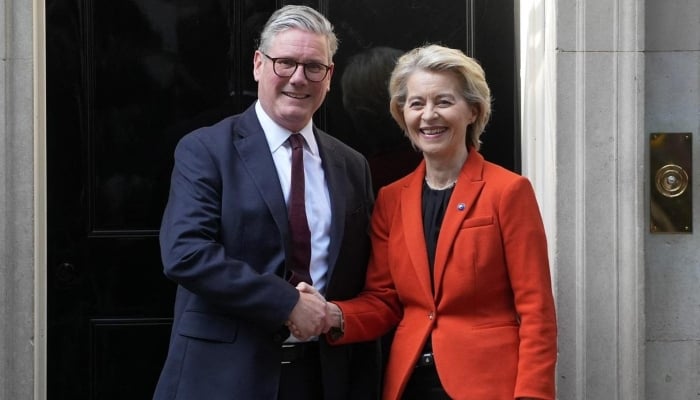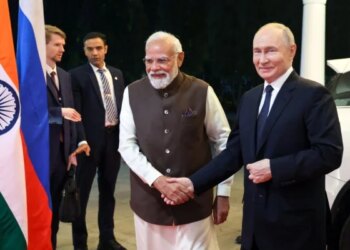Select Language:
- UK PM Starmer and EU leaders to finalize significant defense agreement.
- Resolution on fishing rights and food imports achieved after intense negotiations.
- Youth mobility program left pending for future discussions.
LONDON: UK Prime Minister Keir Starmer is poised to formalize a pact for enhanced relations with the European Union at a significant summit on Monday, marking a new era following Britain’s contentious departure from the bloc five years prior.
European diplomats reported that an agreement was reached on redefining the UK’s relationship with the EU after extensive late-night discussions aimed at resolving critical sticking points.
Member states of the EU had approved three key documents to be signed, emphasizing defense strategies and, following last-minute negotiations, the contentious issue of fishing rights.
Starmer has been advocating for stronger ties between the UK and its European counterparts. His Labour government contends that the deal established by the prior Conservative administration “is not beneficial for anyone.”
Since his election last July, which saw the Conservatives removed from power, Starmer has outlined several non-negotiable points he refuses to overlook.
Certain EU demands have continued to be contentious, with Conservative critics already labeling the initiative a “surrender.” A source involved in the talks informed AFP that there was a “late breakthrough last night, although steps remain to be taken.”
During the meeting, the two sides will sign the “Security and Defense Partnership,” which is anticipated to be the centerpiece of discussions between Starmer and key EU figures such as Ursula von der Leyen, Antonio Costa, and chief diplomat Kaja Kallas.
In addition, two other agreements are expected to be finalized on Monday—a collective statement of European solidarity as a result of the EU-UK leaders’ summit, alongside a Common Understanding addressing trade, fishing, and youth mobility issues.
According to the final agreement, UK waters will remain accessible to European fishermen for 12 years after the current contract lapses in 2026. In return, the 27-member EU will indefinitely simplify regulations governing food imports from the UK, as reported by diplomats.
A general consensus was reached regarding youth mobility, with specifics to be negotiated at a later date. This issue has been a major point of friction, as London is concerned that any youth mobility initiative might lead to a re-establishment of free movement between the EU and the UK.
Context of Russian Threats and Trump’s Presidency
The discussions are taking place amid escalating efforts to rearm in response to threats from Russia and uncertainties surrounding the U.S. commitment to protect Europe under President Donald Trump.
The defense partnership may result in more frequent security discussions, potentially seeing the UK participating in EU military operations and allowing access to a €150 billion ($167 billion) defense fund being established by the EU.
However, many details will likely be developed at a later date.
Enabling the UK’s defense sector unrestricted access to EU programs will require further negotiations.
The UK already maintains strong defense ties with 23 EU members through NATO, so the defense agreement was expected to be the most straightforward aspect of the negotiations.
Olivia O’Sullivan, director of the UK in the World program at Chatham House, expressed caution: “I think we should temper our expectations regarding the significance of this development. It represents the next step toward closer collaboration… yet it does not resolve several outstanding issues,” she commented to AFP.
Starmer has ruled out rejoining the EU’s customs union and single market but appears willing to align with the EU regarding food and agricultural regulations.
Regulatory Challenges and Youth Mobility
“We are determined to reduce bureaucratic hurdles and certifications required, as we want to prevent food from wasting due to trucks waiting hours at borders,” said Nick Thomas-Symonds, the UK’s chief negotiator, in an interview with BBC on Sunday.
While Starmer has dismissed the idea of reinstating unrestricted movement, he remains open to a limited youth mobility scheme that would permit some British and European individuals aged 18 to 30 to study and work in each other’s countries.
Starmer is approaching this topic with caution, as support grows for Nigel Farage’s far-right anti-immigration and Eurosceptic party, Reform UK.
Thomas-Symonds noted that any proposed scheme would be “smart and controlled.” He also mentioned that London is pursuing a faster customs path for British travelers at EU borders.
“Our goal is to ensure that Brits traveling for vacation can enjoy their getaway without getting stuck in long lines,” he added.







